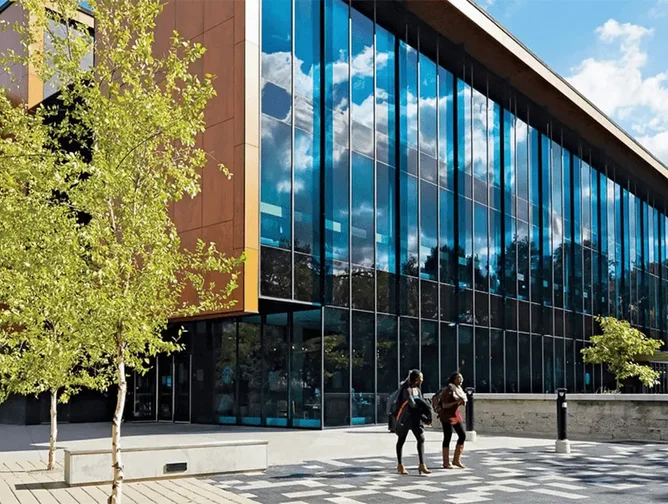Inside the world’s most sustainable university

When it comes to providing sustainable education, Canada leads the charge.
The country is home to three of the world’s top 10 most sustainable universities, according to the just-released QS World University Rankings: Sustainability 2024 – more than any other country.
The QS sustainability ranking evaluates universities based on data used in the QS World University Rankings, with data points including net-zero commitments, renewable energy generation, environmental education, among others.
Western University ranked 10th, The University of British Colombia fourth and the University of Toronto first – making it the world’s most sustainable university.
University of Toronto (U of T) placed first out of more than 1,400 institutions across 95 countries, scoring especially high in the areas of environmental impact and social impact.
With an ambitious goal to be climate positive by 2050, and already ahead of schedule, the 196-year-old university has adopted a whole-of-institution approach to sustainability, which means “looking across the institution systematically for opportunities to integrate sustainability internally and externally, from curriculum to operations to endowment and engagements”, according to Leah Cowen, Vice-President, Research and Innovation, and Strategic Initiatives at U of T.
To achieve this, the university has implemented, and is delivering upon four flagship sustainability programmes – a Climate Positive Plan along with a Sustainability Pathways plan, divestments from fossil fuel investments, and community engaged learning projects.
As Cowen puts it: “Sustainability is one of the most critical issues of our time… it is our unique responsibility as a university committed to inclusive excellence to meet every aspect of this great challenge of the 21st century.”
It is not just a responsibility to the planet but to future generations, many of whom want be part of universities that deliver holistically on sustainability goals.
Recent research from QS found 79% of prospective international students view an institution’s sustainability practices as extremely or very important – demonstrating a “clear shift in priorities among today’s students”, says QS CEO Jessica Turner. “They are increasingly weighing the social and environment impact on their future alma mater alongside academic excellence.”
So what actions is U of T taking in achieving its sustainability goals and what is it doing differently to make it the world’s most sustainable university?
Decarbonising the campus
Focused on regenerative sustainability, U of T’s ambitious Low-Carbon Action plan aims to reduce greenhouse gas emissions by 37% – and to be climate positive by 2050 across its three campuses.
Such a commitment marks the first, if not the only, such net positive commitment by a university – with plans underway to decarbonise its historic St. George campus in the heart of downtown Toronto, along with its other two campuses U of T Mississauga and U of T Scarborough.
In decarbonising its operations, U of T has undertaken a diverse mix of strategies and solutions across its campuses, from improving power and thermal production to distributing energy more efficiently.
Working towards this goal, U of T is building Canada’s largest urban geoexchange field beneath Front Campus, set to be operational in the spring of 2024, along with plans for a significant retrofit of its district energy systems via Project LEAP, an effort supported by the Canada Infrastructure Bank.
Meanwhile, at U of T Mississauga, the campus has a high-tech geothermal system beside the Instructional Centre and is actively expanding the use of solar energy across its buildings. U of T Mississauga also launched Project SHIFT, an initiative to accelerate the transition from fossil fuels to electricity.
Recently, U of T Scarborough opened a new student residence that meets Passive House standards for energy-efficient construction and is also proceeding with new climate-responsible constructions including the Scarborough Academy of Medicine and Integrated Health (SAMIH) and the EaRTH (Phase 2) complex, part of the collaborative EaRTH District initiative that includes plans for a net-zero vertical farm.
EaRTH, which stands for Environmental and Related Technologies Hub, will be a knowledge and training centre at U of T Scarborough focused on the development of clean technologies. Among the partnership’s plans: apply innovative technologies to food production in an urban setting through the development of Canada’s first net-zero vertical farm.

Pathways Programme: Sustainability in education
U of T’s sustainability efforts extend beyond its buildings and into the core of its existence – education.
The university is committed to providing students with sustainability education and learning opportunities, initiatives and events – and sustainability is embedded into academic programmes, research and campus operations.
Nearly 30% of all undergraduate courses at U of T in 2023-24 have a sustainability orientation, up from 25% the previous year, and there are more than 100 graduate and PhD programs with sustainability-related content.
Undergraduate students in all programmes can participate in the Sustainability Pathways program, which allows them to explore sustainability from various disciplinary lenses and perspectives and all students can contribute to real-world sustainability initiatives on- and off-campus via the Campus as a Living Lab and Community-Engaged Learning initiatives.
Extending even further afield, into the cities and surrounding regions, U of T partners with community groups and not-for-profits, industry, businesses, and the healthcare sector to advance research and innovation on climate change.
Internationally, they work with the U7+ Alliance of World Universities, the University Climate Change Coalition (UC3), and The International Sustainable Campus Network (ISCN) – while locally, they work with the Urban Climate Action Project, a university-city partnership to help implement the City of Toronto’s climate action strategy, TransformTO.
And as part of the university's Climate Positive Energy initiative, they are working with industry and the government to launch a testing facility for real-time simulation of electricity grid models in its Grid Modernisation and Testing Centre.
Australia, UK also deliver sustainable higher education systems
While Canada is the world’s most sustainable higher education system by some measures, according to the rankings, Australia and the UK are catching up.
Australia, with two top 10 universities, is among the top performers overall in this year’s rankings, behind Canada – including The University of Sydney (ranked 7th) and The University of Melbourne (ranked 9th).
Two UK universities also feature in the top 10, with Th University of Manchester in third place and Imperial College London in sixth.
Top ten in QS World University Rankings: Sustainability 2024:
- University of Toronto (Canada)
- University of California, Berkeley (UCB) (US)
- The University of Manchester (UK)
- University of British Columbia (Canada)
- The University of Auckland (New Zealand)
- Imperial College London (UK)
- The University of Sydney (Australia)
- Lund University (Sweden)
- The University of Melbourne (Australia)
- Western University (Canada)
- ‘Client Zero’ IBM’s Guide to Using AI for SustainabilitySustainability
- Could AI and Data Help Nestlé Make Coffee Climate Resilient?Sustainability
- Businesses are Getting Sustainability Dangerously WrongSustainability
- Why EY is Warning US & Americas Companies on SustainabilitySustainability






